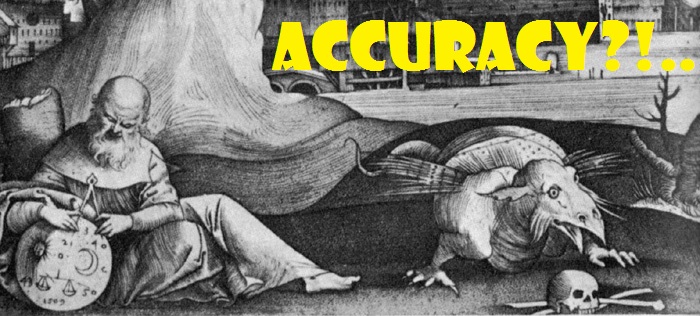
How
important is it, really?...
By
John Townley, September 2014.
When I was
an astrology student,
ten years before the advent
of the personal computer, or even the digital calculator, my various
teachers
made quite a fetish of accuracy and precision. Endless adding and
subtraction
of logorithms of figures extracted from Raphael’s
Ephemeris (or later, The American
Ephemeris) combined with
corrections for local time, distance from
Greenwich, and other factors like precession and nutation eventually
led you to
a precise RAMC (right ascension of the midheaven) which you then looked
up in a
house table and interpolated down the the minute of arc at your precise
local
longitude and latitude. It was supposed to get a chart as accurate as
possible
before you started the less-accurate business of interpretation and
possibly,
shudder, rectification. It was also done to impress both astrologer and
client
alike – like, this is not some sort of mystic, psychic
hocus-pocus, it’s got
lots of calculation, complex rules, and instructions –
it’s math and science,
but linked with fate! Then, of course, the same astrologer would go on
to read
your cards, throw the I-Ching, or interpret the lines in your palm or
your
handwriting.
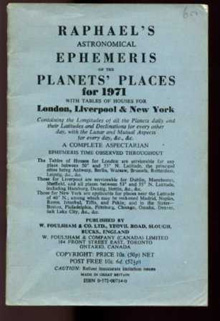
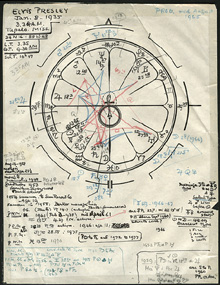
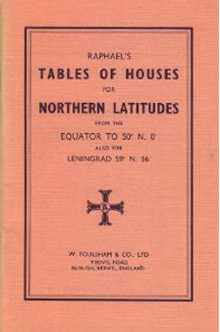
Even before the computer,
astrologers emphasized hand-hewn accuracy, poring over ephemerides and
tables to get precision.
Now, of
course, the chart is
erected by computer, not one
painful horoscope at a time but often slews of them in a batch, and
most users (including
too many who call themselves astrologers) haven’t a clue
whether they’re accurate,
or even know how to check that if they wanted to. And of course, the
user often
as not still mixes it up with some other sort of
“reading”just in
case this literally pseudo-science
doesn’t deliver something that sounds sufficiently
inspiring or personally applicable.
Well, why
not? Because, after all,
astrology
isn’t a science, no
matter how accurate
your chart, it’s a set of traditional interpretations of
extra-terrestrial
environmental patterns and cycles that may or may not actually be
linked to
terrestrial patterns and cycles, which in turn may or may not be linked
to a
particular individual or situation. And, the vast majority of the rules
of interpretation
come from a several-thousand year period before there was such a thing
as a reliable
mechanical clock, much less a chronometer accurate to the minute or
second. So
what’s the point in all this accuracy, and why make such a
fetish about it?
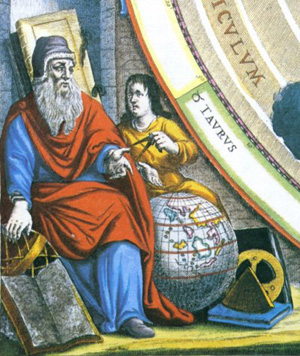
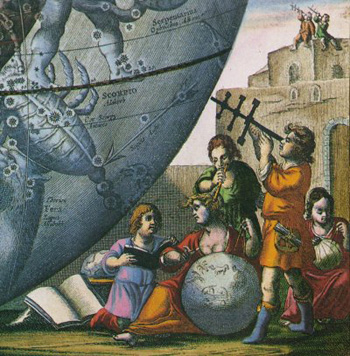 In classical and Renaissance times,
with relatively approximate timekeeping, instruments just weren't that
accurate.
In classical and Renaissance times,
with relatively approximate timekeeping, instruments just weren't that
accurate.
A great deal
of it can be traced to
the very period when
modern science, enabled by the advent of accurate mechanical
timekeeping and more-precise observational instruments, came
in and started selling a world-view of the universe as the ultimate
machine,
beginning in the seventeenth century. Apply that thought to astrology
(which ancient astrologers never did), and it seems the gears of
ineluctable fate
grind very fine and of course you want to be deadly accurate to get it
right.
But that very scientific accuracy and the modern science it gave birth
to also
chased astrologers to the outskirts of town, where at best they
attempted a
residual mishmash of modern science and ancient philosophy. There,
astrologers
hung on by their nails into the twentieth century by trying to call it
some
sort of variant or expansion of psychology which itself might be at
least a soft
science, if not a hard one.
Determinism doesn't fit
The critical
error has been, and
still is, looking at
astrological data as somehow, ultimately and definitively
determinative, as if
you could explain any and every event if you just got enough
astrological
detail on it. That misconception has only been encouraged by the advent
of the
home computer and the ability to fine-tune techniques to a
hair’s-breadth in
hundreds of different ways. If one house system doesn’t work
out for you, then
there are twenty more available to try your luck with. And there are
multiple
zodiacs, dozens more planets both real and hypothetical, and hundreds
of ways to
divide up aspects, not to mention tens of thousands of asteroids (and
don’t forget
the fixed stars, black holes, quasars, and galactic centers single and
combined). There was a glut of this created in the 1970s, and recently
there
has been another explosion – I note that the latest edition
of Cosmic
Patterns/Matrix astrology software has just added over fifty more
technique
options just this year, all of which can be cross-combined.
It’s truly
staggering. In fact,
virtually every
astrological technique that requires greater than a degree of accuracy
on the
Angles has been invented in only the last 100 years, the majority of
that since
the advent of the personal computer. And any possible real or imagined
application they have is based not on large-scale scientific studies,
or even
generations of cross-fertilizing academic traditions, but the personal
claims
and experience of individual, modern real (or in many cases just
self-alleged)
astrologers.
With the
blinding array of
high-precision options available
with all this, you’d think the answer to any question has got
to be in there
somewhere. It’s kind of like the monkeys at the typewriters,
have at it long
enough and eventually you get Shakespeare…
A false premise
But you
don’t, because
the premise itself is false. And that’s
because astrological interpretation itself predates modern accuracy and
the
idea that the universe is a predictable machine. That astrologers
should mix
apples and oranges that way got them (us, I’m one!) fairly
ostracized by both
real science and most accepted religion and philosophy. Always a little
behind
the curve, by the time astrology had thoroughly adopted the new
Cartesian,
machinelike view of the world, science abandoned it for the
indeterminism of
quantum theory…which lately much New Age fruitloopery has
attempted to
cherry-pick without much success, while astrology never even got a
proper handle
on it.
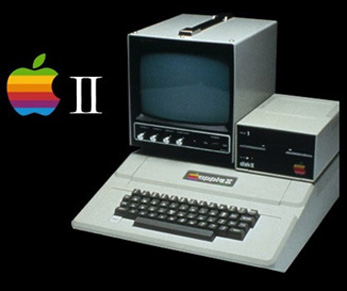
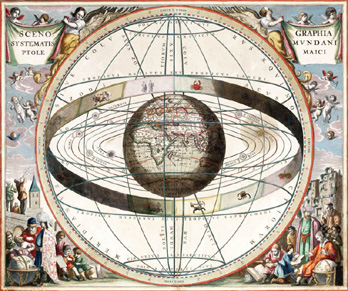 The
arrival of the
personal computer further cut astrologers off from the fluidity of the
original astrological world view.
The
arrival of the
personal computer further cut astrologers off from the fluidity of the
original astrological world view.The fact is,
Classical and even
Renaissance astrology leaned
on a much more fluid version of reality, both observationally and
philosophically. Even the spheres of the heavens
themselves didn’t move in lock-step with each other, but had
paths of their
own, driven by God (or earlier, the gods), including angels, demons,
kingdoms, principalities
and powers, and more. When they all got into synch, something really
momentous
would happen down here, and if not, not. It all was purported to affect
us mortals in
a fairly pyramidal way, from princes and kings on down to the peasantry
– traditionally,
the planets were always more concerned with the former than the latter.
In a
strange (and perhaps realistic) way, the ordinary person had more
freedom from Destiny
than the more powerful ruling classes, and Fate was ineluctable in a
general
way but fickle when it got down to specifics.
And if you
look at astrology that
way, as levels of environmental
cycles upstairs which step down and link fluidly with ones on earth
which then become
the “tides of the affairs of men” upon a patch of
which each individual
uniquely rides depending on his/her initial conditions, then
you’re much more
likely to get something useful out of this ancient art. It’s
really much more
indeterminately “quantum” in the general sense,
where a trend (a wave) doesn’t
become a reality (a particle) until it actually happens as an event,
after some
small, unforeseeable resonance tips the balance and probability
cascades into
specificity – and then, strangely, events-at-a-distance can
be spookily connected
by astrological mutuality, for a brief moment at least.
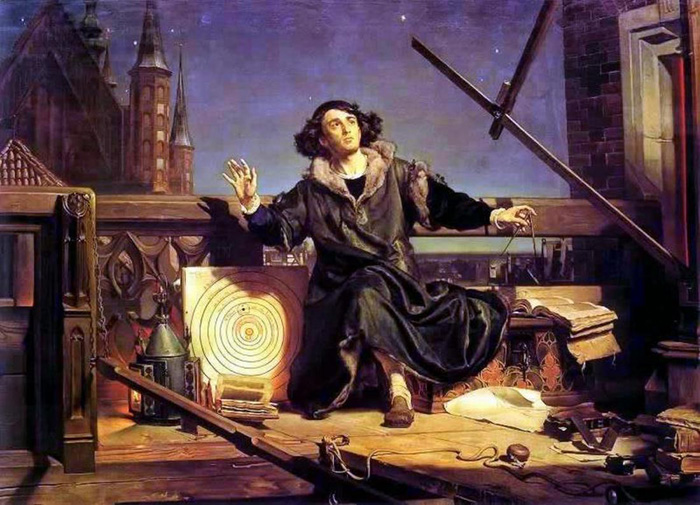
The ancients
looked up at the sky,
measured and mulled over
it the best they could with minimal gear, and after careful
consideration of
the realities of their immediate surroundings then did an
often-accurate
seat-of-the-pants analysis. Actually, a modern TV weatherperson does
much the
same, but with the whole of NOAA and the NWS to back it up (wish we had
that
sort of funding!), where at least massive observational accuracy does
indeed
count…and yet it’s still up to you to look out the
door to see if it really is
raining as predicted, and decide whether or just how you want to get
wet…
Not
a
newsletter subscriber already? Subscribe
Free
Here!
And
every day, keep in touch with our Astrology In The News section...please
take a look! --
Breaking news from
around the globe, plus articles, reviews, it's all happening there,
changes daily..

